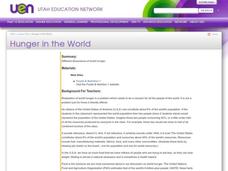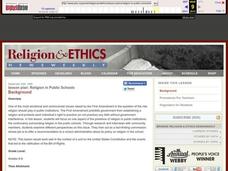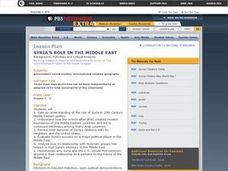National History Day
Challenging the Status Quo: Women in the World War I Military
Why are some so resistant to change? The status quo is often to blame for a lack of forward movement in society. Following the events of World War I, women in America suddenly had a voice—and were going to use it. Scholars use the second...
Judicial Learning Center
State Courts vs. Federal Courts
Popular culture often portrays the Feds as the most fearsome of law enforcement agencies. Yet, someone charged with a crime is considerably more likely to end up in a state court. The lesson, one of six covering the Organization of the...
Curated OER
George Washington Crossing the Delaware: A Study of Setting and Character
Students examine "Washington Crossing the Delaware." For this American Revolution lesson, students analyze the painting, research its background, and then perform skits based on their findings.
Curated OER
Civil War
Students explore rules of conduct in a political body, first drafting rules that apply to their classroom, then adapting them to political actions in Congress.
Curated OER
Texas v. Johnson
Students examine the freedom of speech. In this Supreme Court lesson, students analyze primary documents from Texas v. Johnson and discuss the implications of the decision regarding flag burning.
Curated OER
Raids and Arrests of Enemy Aliens
Student read background summary information and debate how much control did the government require to keep the nation safe. They research how World War II restrictions on enemy lines were enforced and how it related to the U.S....
Curated OER
Due Process
Students understand the legal term "due process of law" and its historical origins. They discuss the requirements for "due process of law" in both the U. S. Constitution and the Indiana Constitution and how those rights are similar or...
Curated OER
Executive Orders
Students interpret historical evidence presented in primary and secondary resources. In this foreign policy lesson, students examine U.S. foreign policies of Presidents since World War II. Students prepare PowerPoint presentations with...
Curated OER
What Is the Role of the President in the American Constitutional Government?
Students read about the role of the president. In this US government lesson, students read about the role of the president as stated in the US Constitution. Students examine issues of presidential power and identify various checks and...
Curated OER
Uniform Blues
Fourth graders explore what the U.S. Constitution is and why it is important, the purpose of the state constitution, and its relationship to the U.S. Constitution and the similarities and differences among federal, state and local...
Curated OER
Lesson on Federalism
Eleventh graders study Federalism and delegated, reserved, and concurrent powers. They participate in a simulation in which they role-play Federalists and Anti-federalists debating which powers should be categorized as delegated,...
Curated OER
What Is the Bill of Rights?
Students discuss the purpose of the Bill of Rights and the United States Constitution. In groups, they write about the ten amendments and their purpose. They re-word the Amendments in their own way and answer discussion questions to end...
Curated OER
John G. Roberts, Jr. -- Nominee, Chief Justice of the U.S. Supreme Court
Students examine the life and work of John G. Roberts, the nominee to be the Chief Justice of the Supreme Court. In groups, they use the internet to define the role of the Chief Justice and complete handouts to record their information....
Curated OER
State Symbols
Third graders examine the symbolism of the United States by observing different flags. In this U.S. History lesson, 3rd graders utilize the Internet to research state seals, flags, and other symbols that represent specific areas of our...
Curated OER
Lesson 2: The Tired King
Middle schoolers are introduced to the three functions of government (legislative, judicial, and executive). They read and discuss a story about an overworked king who must handle all the tasks of government. Students give a description...
Curated OER
POWERS OF THE PRESIDENT: THE CASE OF LATVIA
Students compare the powers of a U.S. president to those of leaders of other countries. They pretend they are presidential advisors and make decisions as a group as to what the president has the right do in different situations.
Curated OER
War Making: Executive and Legislative Powers
Students examine executive and legislative powers. In this federal powers lesson, students determine who has the power to wage war in the U.S. government. Students analyze the Constitution and research historical precedents regarding...
Curated OER
The President's Role and Succession
Fourth graders examine the role the President of the United States plays in American government and the order of succession of cabinet members. They explain about presidential qualifications and the path to becoming President.
Curated OER
Hunger in the World
Consider various aspects of world hunger in this writing lesson. After taking a pre-test, middle and high schoolers play a map game, analyze and discuss world statistics, and write a report on an assigned country. The lesson can apply to...
Curated OER
Religion in Public Schools
Seventh graders conduct research on important background information regarding the role of religion in American public schools. In this Ethics lesson, 7th graders examine and become familiar with the First Amendment of the Bill of...
Curated OER
Who are American Citizens?
Students investigate American citizenship. In this civics lesson plan, students consider the basic knowledge of U. S. government new citizens are required to have. Students also examine the 14th amendment that describes U. S. citizenship.
Curated OER
War and International Law America’s Foreign Policy: Military Intervention
Students analyze America's foreign policy. For this military intervention lesson, students listen to their instructor present a lecture on U.S. military interventions since 1989. Students respond to discussion questions about the lecture.
Curated OER
Syria's Role in the Middle East
High schoolers hypothesize why Syria and the U.S. should find common ground in their relationship as it pertains to the future of the Middle East.
Curated OER
Susan B. Anthony and the 19th Amendment
Students take a closer look at the Women's Suffrage Movement in America. In this women's rights lesson, students research suffrage leaders and write papers about them. Students then read and discuss information about Susan B. Anthony's...

























